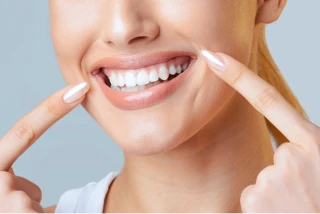
Understanding Porcelain Veneers
Porcelain veneers are one of the most popular solutions in cosmetic dentistry. Designed to create a flawless smile, these ultra-thin shells of medical-grade ceramic are custom-made to fit over the front surface of your teeth. They’re ideal for enhancing your appearance by correcting a variety of imperfections — from discoloration to gaps to misaligned teeth.
Crafted with precision, porcelain veneers are bonded to your natural teeth and mimic the light-reflecting properties of real enamel. They offer both durability and beauty, making them a sought-after choice for those dreaming of a perfect smile.
What Are the Benefits of Porcelain Veneers?
Cosmetic Benefits
- Whiten severely discolored or stained teeth
- Correct minor alignment issues and close small gaps
- Reshape uneven or misshapen teeth
- Instantly create a uniform and symmetrical smile
Functional Benefits
- Strengthen chipped or worn-down teeth
- Provide added protection against further enamel erosion
- Restore confidence and improve self-esteem
Patients often report that their smile feels more confident, youthful, and photo-ready after treatment. And because porcelain resists stains better than natural enamel, you’ll enjoy a brighter smile longer.
Common Dental Issues Porcelain Veneers Can Fix
- Chipped or cracked teeth
- Severe discoloration
- Gaps between teeth
- Mild misalignment
- Worn enamel
Ideal Candidates for Porcelain Veneers
You May Be a Good Candidate If:
- You have healthy gums and teeth with no active decay
- Your enamel is strong enough to support a veneer
- You have realistic expectations about the outcome
- You are looking for long-term solutions for cosmetic improvements
- You practice good oral hygiene and regular dental visits
Who May Not Be a Good Candidate?
- Bruxism (teeth grinding)
- Extensive tooth decay
- Severe misalignment or bite problems
- Insufficient enamel
- Unrealistic expectations
Age and Health Considerations for Veneers
- Gum Health
- Oral Hygiene
- Medical Conditions
Smile Design: Personalizing Your Veneers
- Assessing facial symmetry, lip dynamics, and skin tone
- Customizing tooth shape, size, and color
- Using digital imaging to preview your new smile
The Porcelain Veneers Consultation Process
- Initial evaluation
- Discussion of your goals
- X-rays or digital scans
- Smile preview using imaging or mock-ups
- Treatment planning
Diagnostic Tools and Smile Simulation
- Digital Smile Design (DSD)
- 3D Scanning and Impressions
- Photographic Analysis
Preparing Your Teeth for Veneers
- Removing a thin layer of enamel
- Taking impressions or digital scans
- Applying temporary veneers
The Procedure: What to Expect
First Visit:
- Tooth preparation and impressions
- Temporary veneers placed
Second Visit:
- Bonding permanent veneers
- Adjusting and polishing
Post-Procedure Care and Maintenance
- Brush and floss regularly
- Avoid chewing hard objects
- Use a non-abrasive toothpaste
- Visit your dentist every 6 months
Costs and Insurance Coverage
Porcelain veneers cost between $900 to $2,500 per tooth, depending on factors such as dentist expertise, location, and materials used. Most insurance plans do not cover veneers, but financing options are available.
Comparing Veneers to Other Cosmetic Options
| Treatment Option | Best For | Durability | Cost Range |
|---|---|---|---|
| Porcelain Veneers | Severe stains, gaps, chipped teeth | 10-15+ years | $$$ |
| Dental Bonding | Minor chips and cracks | 3-5 years | $ |
| Teeth Whitening | Surface stains and discoloration | Varies | $-$$ |
| Crowns | Damaged teeth needing full coverage | 10-15 years | $$ |
Real Patient Testimonials & Case Studies
“Before veneers, I never smiled in photos. Now, I can’t stop showing off my teeth!” — Jessica M.
“The process was easier than I expected, and I love my new smile. My veneers look so natural.” — Ryan T.
Frequently Asked Questions (FAQ)
- Do porcelain veneers hurt? Not at all. The process is minimally invasive and usually requires only local anesthesia.
- How long do porcelain veneers last? With proper care, they can last 10–15 years or longer.
- Can I eat normally with veneers? Yes, but avoid biting hard items like ice or pencils.
- Will veneers change the way I speak? There may be a short adjustment period, but most patients adapt quickly.
- Are there alternatives to veneers? Yes—bonding, crowns, and orthodontics may be recommended in some cases.
- How do I know if I’m a candidate for porcelain veneers? A dental consultation is the best way. Your dentist will evaluate your oral health, goals, and expectations.
Final Thoughts: Is It Time to Enhance Your Smile?
Porcelain veneers offer a stunning, long-lasting solution for anyone dreaming of a better smile. Whether you’re dealing with discoloration, chips, or gaps — this cosmetic treatment could be your key to renewed confidence.
If you’ve been wondering, “Am I a good porcelain veneers candidate?” — now you know what factors matter. Schedule your veneer consultation today and take the first step toward your dream smile.
